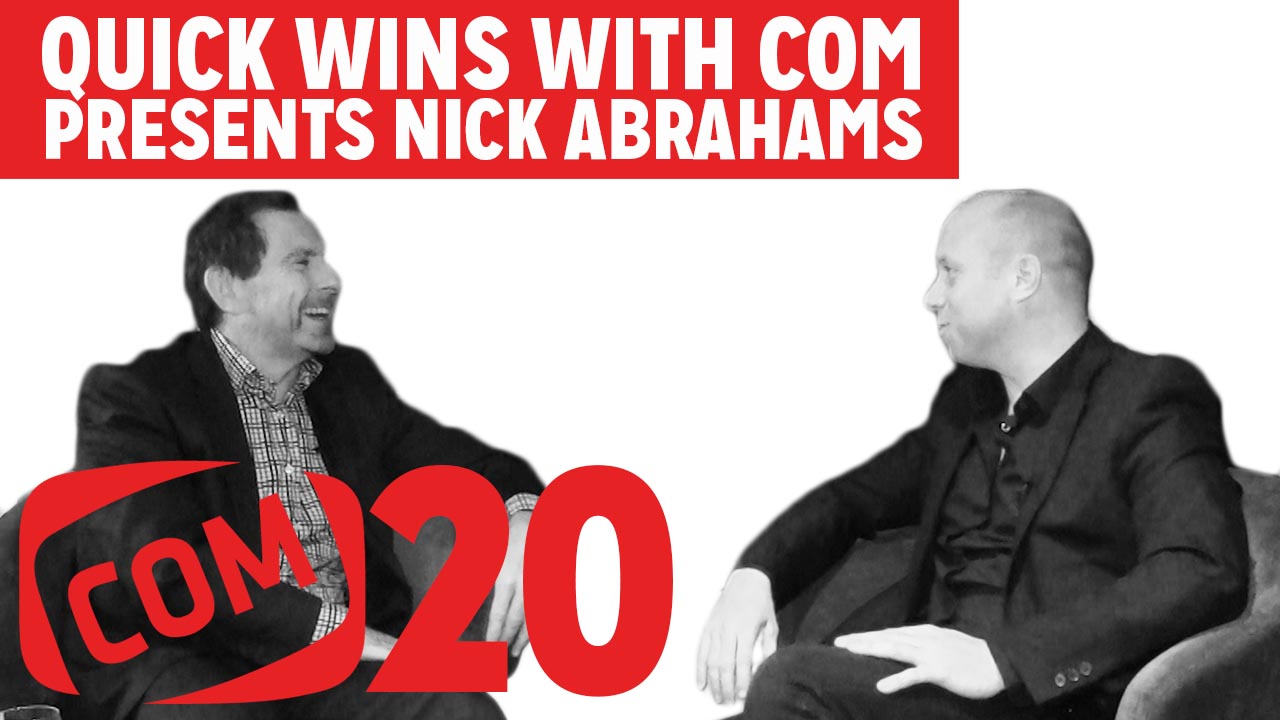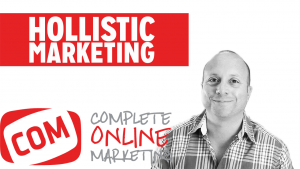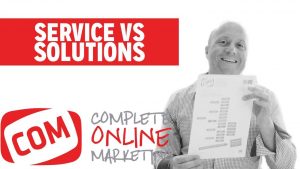Why Innovation? Nick Abrahams – Quick Wins with COM Presents Episode 20
This week on Quick Wins with COM we are changing up the formula slightly. We are starting a segment called Quick Wins with COM Presents. Which will entail a interview with a current Market Leader in any industry. Richard will pick their brains and get in depth insight to how they are successful in their respective industry.For our first episode in this style we have Nick Abrahams.Nick is a partner at Norton Rose Fulbright & Investor in Lawpath. He has also written the book titled “Digital Disruption In Australia”.
Nick Abrahams has been speaking publicly talking about digital disruption for over ten years. So Richard sparks the discussion about Innovation in todays market.First about why innovation is the hot topic at the moment in Australia. Then about innovative partnerships, and lastly about Nick innovation predictions at the moment.
What do you think of this new style? It won’t be every week but we will keep doing them every now and again.
Listen to the Quick Wins podcast on iphone
Video Transcription
Richard : Welcome back to Quick Wins with COM. I’m your host Richard Toutounji, and today we’re going to be innovating, we’re going to be trying something a little bit different. We’ve got an episode called Quick Wins with COM Presents, and I’ve got a great presenter who we’re going to present which is Nick Abrahams. Nick Abraham has pretty much changed the entire tech space in Australia, really pioneered this industry. He’s got a great book out called Digital Disruption, and he’s going to take us through what innovation really means, and how you can actually innovate your business. It doesn’t matter what business it is, what innovation means to you, and how you can really take it forward. How do you stay innovative, stay at the top of your game in your industry? I thought for this interview let’s talk to Australia’s leading technology lawyer Nick Abrahams. Welcome to the show.
Nick: Thanks.
Richard : Thanks Nick. Nick you’ve really been in the forefront or in really in the depth there of technology, innovation, and startups that come to Australia, investing in Australia and I thought, you know, we do a lot of traditional businesses here, and I wanted to make sure that, how can … I wanted to ask some questions around this innovation space because we’re hearing innovation everywhere now.
Nick: Yeah, yeah.
Richard : [Mining’s 00:01:06] gone, innovation is here, I thought you’ve been in this space for a long time before it was even a hit word. I wanted to get your opinion on this whole innovation game. What’s it all about?
Nick: Yeah, well, I’ve just got to say, there is one reason why innovation is the government buzz word, and that is because the mining boom has gone.
Richard : Officially gone.
Nick: Gone for the moment anyway, and fingers crossed it stays away for a while so we can have some fun in the tech community. Just look at the raw numbers, after the dot com crash, we had almost no tech IPO’s in Australia until 2013 when we had 5 and then 2014, we had 45, and then 2015 we had 55.
Richard : We were growing fast.
Nick: Yeah, so there’s been a lot of capital which has surged into the tech sector. People are talking innovation, and I think we talk about innovation, we talk about technology perhaps in the same breathe, and whilst technology is a part of innovation, it’s obviously not the whole thing.
Richard : When you say it’s not the whole thing, it’s a large part, is that because it’s the new technology coming through? When we talk about innovation and you say it’s not part of technology, what would you refer that to?
Nick: I see innovation as anything that you do as an organization which will increase your business in some way, so increase the stickiness of your users, increase your revenue. That can happen in a variety of ways. There can be workforce innovation. Do you move to a contractor model? Do you change the structure? Do you use people who are less qualified to do different sorts of work? Do you offshore things? There’s innovation that you can do across a variety of areas, and technology can be an enabler. We’ve seen in the past that just using technology as a means of innovation for the sake of it can be catastrophic.
Richard : Sure, so I really like that because we [have 00:03:03] a lot with traditional businesses, plumbers, the [lockers 00:03:06], the carpenters, the personal trainers, and sometimes yeah, it’s about, what you’re saying, it’s just changing a contractor model or changing staff retention rate. That is innovation.
Nick: Yeah, and I think to one of the big things that I think we need to think about when we talk about innovation is how can you work with an ecosystem? Right at the moment I think what’s happened at big coporates and at the smaller end of the market is people are recognizing that you can’t do it all yourself. There’s too much out there. How can you work with an ecosystem around you and partner in order to bring some sort of innovative product to market?
Richard : Explain an eco … I really love this concept, the ecosystem. We were talking about it earlier. When we say an ecosystem, you’re basically saying more of a partnership with other sort of similar organizations that will help move the business forward, is that what you’re talking about?
Nick: Yeah, yeah. They can be similar or they can be completely dissimilar. If you look at [Swinbure 00:04:08] Online, that’s a wonderful example of partnering in this new world. Swinburne University needed to go online. It had not been going well with its online engagement. We joined together with Seek, so better known as the website where you go for employment. They joined together to create Swinburne Online, and that has been an enormous success. It’s taking Swinburne’s courses online, but it’s using Seek’s know-how in the online space and Swinburne’s obvious reputation and knowledge as an educational facility. You bring those 2 together, and boom, you’ve got a real disruptor.
Richard : That is really, that’s really cool because you really literally can have a business, a traditional industry, a traditional business, and it’s about thinking outside the box of how you can best step moving that whole business or industry forward just by thinking a little bit differently. Do you believe that now, you know, obviously the government is getting behind innovation much more, do you believe now people are more aware of these new opportunities would you say? Is it becoming more and more and more that people wanting your services as well for mergers, for acquisitions, for startups?
Nick: Oh yeah, I mean this has been a massive few years in terms of people seeking out legal advise to figure out how they partner with other organizations, but also the buying and selling of technology enabled businesses has been very large. Now is the right time, and if you look at it, it is remarkable because now for the first time ever, Australia is in a position where this whole tyranny of distance that we had has been completely undone. I’m working with clients today who are growing global businesses from day 1. You couldn’t do that before. You know, 10 years ago, you couldn’t reach a global marketplace with the technology business. You had to, from Australia, you had to go and setup servers and field sales people in the US to go and knock on doors and sell things. Whereas you look at …
My favorite story is I got a call one day from this guy, Chris Strode. He calls me up, and he goes, “Hi, I need to get an investor in my tech company. I heard you can do it. I’m in the Central Coast.” I’m like, “What technology compnanies are there in the Central Coast? I’ve never heard of such a thing.” He goes, “Oh yeah, well, no. It’s an app. I’ve built an app.”
Richard : I bet you get those stories all the time. “I built an app [crosstalk 00:06:52].”
Nick: Yeah, I hear it, you know, there’s a lot of people, and that’s fine. I love hearing what entrepreneurs are doing. I’m like, “An app on the Central Coast, wow. That’s one.” I said, “Who do you think is going to buy that business?” He then said, “Well, I’ve got a term sheet from Excel Partners”, which is one of the leading Silicone Valley Venture Capitalists, and then he reeled off 2 other VC’s from the states who are also equally as credible. Ultimately, we did a deal for Chris where they invested $30 million on a $100 million evaluation. He built that business from 0 to $100 million evaluation at Copa Cabana Beach.
Richard : At Copa Cabana Beach, huh.
Nick: There’s nothing there. I mean, there’s a great beach, but it just goes to show that you can do anything. That is the global leader in, it’s called Invoice to Go, in mobile invoicing. He did that from a beach side suburb north of Newcastle.
Richard : Yeah, Invoice to Go, I mean, everybody’s heard that [inaudible 00:07:59]. That’s a really good, and I’ll sort of probably finish up here, but how do you predict such a thing? We saw Fit Bit and then all of the sudden now we have 30 watches that do the exact same thing.
Nick: Yeah, yeah, yeah, of questionable utility, you’d have to say. It’s like, do I really care how many steps I’m taking. I got a rough idea. It’s not changing too much day to day.
Richard : Yeah, so it’s everywhere now. Give us a couple tips and suggestions of how in our industry, if we’re a traditional business even, in our industry, how do we predict what’s happening, even if we’re not a business owner that’s a futurist, how do we capture and make sure that we’re not falling too far behind? What do we need to look out for?
Nick: Yeah, so you mentioned it before which is that concept of, I think, everything as a service. The idea of subscription models to whatever you can get your hands on. That’s absolutely a thing which we keep seeing time and time again whether it’s legal, whether it’s how you get service through Amazon web services. That’s something that started at the technical level, but has come through, so insurance, those sorts of things. I think everything has it, so try to see … People love a subscription model, and frankly it’s great for a business. Moving from a transactional model to a subscription model. As a locksmith, is there a deal to be done where you can say to someone, “Oh, we’ll make sure your locks are always working for the whole year, and you pay me X dollars.” I don’t know whether that works. I see that as a critical part of things.
The other thing which is really important is just this idea of partnering. The way I see it is the innovative compnanies are looking around to see who has either a product or service that I can bundle with my existing service to make an offering that is more attractive to my end user or stickier with my end user. How can I bundle someone else onto what I’m doing to get a better solution to the client that they will stay with me longer, or looking for someone who’s got an audience or a customer base that I can’t access, and I want to work with them on that. That’s where … Let’s say, for example, you traditionally, you’re deep in, you’re a locksmith, and you’re great in hospitality, and you wonder, “How do I get into hospitals? Who can I work with there? Who can i approach to provide a solution where I can be bundled in with someone else’s product?” They’re the 2 things which I feel are very strong. There’s a lot of hype certainly around internet of things, mobility, everything mobile, everything to the phone.
Richard : I hear this year is one of the first years that more people own mobile devices than computers.
Nick: Right, yeah, yeah.
Richard : It’s all about mobile still, yeah.
Nick: Yeah, and interestingly what happened with Invoice to Go, the idea of mobile invoicing, well that seems like a pretty simple idea, right, but reason why Excel invested in that business is because that was born digital and born mobile. It wasn’t someone who was trying to morph a platform from a desktop into a mobile environment, but it was so native to the mobile environment that it was just a beautiful experience. I mean, the other thing that is critical is around user experience. If you look at Uber, Uber is successful because it’s an amazing user experience. It is illegal in many places. I mean, it’s legal now in [inaudible 00:12:01], but when it started, it was illegal. There’s another business called Go Catch out here which is a similar sort of space. What’s happened there is Uber came in, and they said, “You know what, we may not be legal, but we’ve got a war chest set aside to pay for fines.” They just went ahead and we’ve all come around. We keep going, “We love this experience.”
Richard : We have come around.
Nick: Yeah, and the government has gone, “Well, hang on, the people love it, so we’d better follow along with it.” What’s happened is regulation gets trumped by user experience. It creates … Airbnb, illegal, largely when it started, and now so many people use it. The government will respond to the pressure of the people. The people say, “Airbnb, we like,” that’s staying. You need to think about how can you innovate. The reason I mentioned Go Catch because Go Catch didn’t have the war chest to say, “We’re just going to go down that Uber model and we’ll just pay for any fines.” They didn’t have that money, and so consequently Uber has stolen significant market share in Australia. User experience is critical, and that’s where the big opportunities for our kids and so forth. Things like data science, user experience, product management, online product managers, things like that, that’s where things are. Don’t do law, kids. Promise me you won’t do law.
Richard : No, it’s so interesting, your wealth of information. I’m just thinking out the ideas in my head, and partnerships, and it really is a platform right now to go out there and find that innovating way that you can take that step in a business and transaction and make it more exciting, make it better, make it stickable, as you say to continue the growth that we need to move forward. Yeah, awesome.
Nick: Yeah, yeah. Yeah.
Richard : I’m going to leave it there. As I said, I could sit here all day and talk.
Nick: It’s been great.
Richard : Thanks so much, I appreciate it.
[fl_builder_insert_layout id=”6108″]




